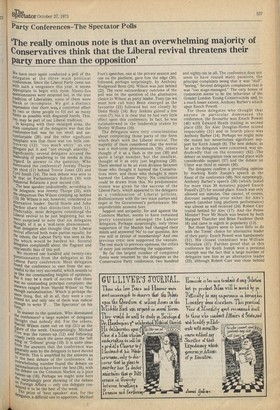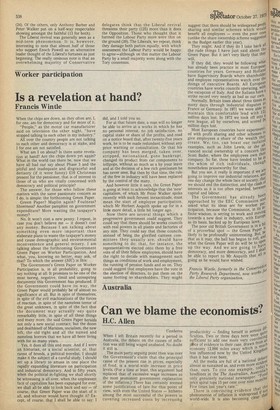Party Conferences—The Spectator Polls
'The really ominous note is that an overwhelming majority of Conservatives think that the Liberal revival threatens their Party more than the opposition'
We have once again conducted a poll of the delegates at the three main political conferences. Since the Liberal Party came out With such a vengeance this year, it seems appropriate to begin with them. Ninety-five questionnaires were returned but, in the true Iradition of Liberalism, some of them were Olank or incomplete. We got a distinct Ippression that there was, a concerted effort ?Y two or three people to fill out as many terms as possible with disguised hands. This, too, may be part of our Liberal tradition. In keeping with their enlarged aims, the nniin complaint of the delegates was that the Conference hall was far too small and uncomfortable (20), and the other significant coMplaint was that there was too little controversy (12): "too much unity" as one delegate put it and "not enough anarchy." significantly, several delegates accused the leadership of pandering to the media in this rjegard. In answer to the question, Who oominated the conference? Jeremy Thorpe 1...,ao third (11) behind Trevor Jones (23) and Yril Smith (14). The best debate was seen to 0,e that on Parliamentary Reform (30) with Industrial Relations a poor second (10). „The best speaker undoubtedly, according to 'Ile delegates, was Jeremy Thorpe (33), with the ubiquitous Des Wilson creeping up behind (13). Mr Wilson is not, however, considered an alternative leader: David Steele and John ptrdoe share that distinction (both 11). Jedictably, most delegates considered the
beral revival to be just beginning but we Were surprised to note that six delegates
ought of it as a 'mid-term phenomenon.' most delegates also thought that the Liberal revival affected both main parties equally; for the others, the Labour Party was seen as the 0,ne which would be hardest hit. Several nelegates complained about the flagrant and Unscientific bias of this poll. We received one hundred and twenty-two 9Uestionnaires from the delegates at the 1.-abour Party conference. Most delegates '0Und the conference to veer from the successful to the very successful, which sounds to tits like the commanding heights of optimism. ‘,.14 it may be a mark of success that there as no outstanding principal complaint: the answers ranged from 'Harold Wilson' to 'Not enough nationalisation.' Which is perhaps the !atrie thing. But, all in all, they were a contented lot and only one of them was radical ,enough to write 'F ... The Spectator' on his tont, ,,T In answer to the question, Who dominated ,e conference? a large number of delegates 'it'ntight that nobody did. For the others, :?arold Wilson came out on top (31) as the pure of the week. Unsurprisingly, Michael 43°t was the runner-up (12) and following
osely
Win
(with much the same impact) the 'left ,
fr g or Tribune' group (10). It is quite clear °rn the answers that the conference was fenerally seen by the delegates to have moved ,eftWards. This is amplified by the answers as o‘o the best debate of the conference. An „verwhelming number found the debate on tlatlonalisation to have been the best (38), with rne debate on the Common Market as a poor :1°er-up (18). Perhaps we might note here 0 e Surprisingly poor showing of the debate 21 Foreign Affairs — only one delegate conIred it to be the best of the week.
he prize of 'best speaker' was, for the
del he a difficult one to apportion. Michael
Foot's speeches, one at the private session and one on the platform, gave him the edge (30), followed, perhaps surprisingly, by Anthony Wedgwood Benn (24). Wilson was just behind (22). The most extraordinary outcome of the poll was on the question of the alternative choice to Wilson as party leader. Tony (as we must now call him) Benn emerged as the favourite (22) followed but not closely by Denis Healy (14). Roy Jenkins gained a few votes (7), but it is clear that he had very little effect upon this conference. In fact, he was outshadowed in the leadership stakes by Shirley Williams (10).
The delegates were very conscientious about completing those parts of the form which dealt with the Liberal revival. The majority of them considered that the revival was a mid-term phenomenon (58), others thought of it as a flash in the pan (30) and quite a large number,'but the smallest, thought of it as only just beginning (20). There seemed to be an even division between those who thought it harmed the Conservatives more, and those who thought it more harmed the Labour Party. No conclusion could be drawn from this. No predominant reason was given for the success of the Liberal Party, which appeared to the delegates as a combination of Liberal policies, disillusionment with the two main parties and anger at the Government's performance. Mo unpredictable answers here.
Support and antipathy, for and against the Common Market, seems to have remained pretty consistent amongst the Labour delegates. Perhaps surprisingly, only three . supporters of the Market had changed their minds and answered 'No' to our question, Are you still in favour of membership? And one previous critic now supported the venture. The rest stuck to previous opinions, the critics of entry just outnumbering the supporters.
By far the largest number of completed forms were returned by the delegates at the Conservative Party conference, two hundred and eighty-six in all. The conference does not seem to have roused many passions, the principal complaints being that it was "dull", "boring." Several delegates complained that it was "too stage-managed." The only bones of contention seems to be the behaviour of the Greater London Young Conservatives and, to a much lesser extent, Anthony Barber's attack upon Enoch Powell.
For those delegates who thought that anyone in particular dominated the conference, the favourite was Enoch Powell (48) with Edward Heath trailing in second place (35). Sir Alec Douglas-Home scored respectably (21) and in fourth place was Anthony Barber (14). Perhaps we might note the muted but nevertheless significant support for Keith Joseph (8). The best debate, as far as the delegates were concerned, was undoubtedly that on the economy (62). ,The debate on immigration took second place with considerable support (37) and the debate on Ulster was third in esteem (26).
The delegates confirm a prevailing opinion by marking Keith Joseph's speech as the finest of the conference (49). Not surprisingly, Anthony Barber's speech (28) (which lasted for more than 30 minutes) pipped Enoch Powell's (27) for second place. Enoch was only allowed ten minutes. One cannot, of course, discount sampling error either. Sir Alec's speech (another long platform performance) was almost as well received (24). Robert Carr trailed behind Sir Alec (17). And the Prime Minister? Poor Mr Heath was beaten by both Margaret Thatcher and Brian Faulkner (both 16) and came in eighth in popularity (13).
But these figures seem to have little to do with the Tories' choice for alternative leader of their party. Enoch Powell won handsomely (51). His closest contestant was William Whitelaw (37). Further proof that at this conference Sir Keith Jogeph won a personal triumph was the fact that a large number of delegates saw him as an alternative leader (25), although Robert Carr was close behind
(24). Of the others, only Anthony Barber and Peter Walker put on a half-way respectable showing amongst the faithful (13 for both).
The Liberal revival was generally, seen as a mid-term phenomenon. It is, however, interesting to note that almost ,half of those who support Enoch Powell as an alternative leader thought of the Liberal's fortunes as just beginning. The really ominous note is that an overwhelming majority of Conservative
delegates think that the Liberal revival threatens their party (125) more than it does the Opposition. Those who thought that it harmed the Labour Party more were thin on the ground (39). The Liberals, we repeat, thinIc they damage both parties equally, with Which assessment the Labour Party would be happy to agree—although on this matter the Labour Party by a small majority went along with the Tory consensus.



































 Previous page
Previous page